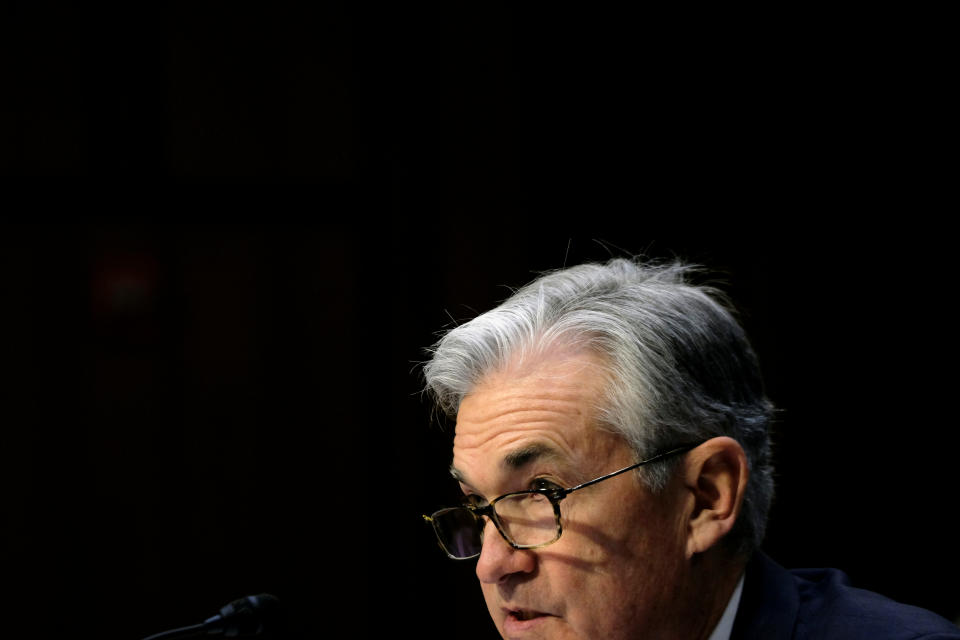Fed Chair Powell on economic expansion: 'No reason why it can't last'
Federal Reserve Chairman Jerome Powell said Thursday that the U.S. should be able to steer clear of a recession, as it continues to extend the longest economic expansion on record.
“In principle, there’s no reason why it can’t last,” Powell told the House Budget Committee in testimony. “At the risk of jinxing this, I would say that in principle there’s no reason to think, that I can see, that the probability of a downturn is at all elevated.”

Powell said he does not see any parts of the economy that are “really hot,” referring to inflated asset valuations that could resemble the mortgage bubble that triggered the last financial crisis. He reiterated that the consumer, which represents about 70% of the economy, remains strong despite weakening manufacturing and exports.
Powell added that financial markets also do not appear to show signs of a “build-up of leverage,” despite concerns over leveraged loans and corporate debt. Fed officials have flagged rising levels of poorly rated corporate debt as a possible risk to the financial system, but Powell said there is nothing “troubling from a financial stability stance.” His remarks preview a new report expected from the Fed on Friday that will provide updates on financial risks that could upend the economic recovery.
“I would say this expansion is on a sustainable footing and we don’t see the kind of warning signs that appear in other cycles yet,” Powell said on Thursday. “Of course you never really know but I would say we watch these things very carefully and that’s what we’re seeing right now.”
The Fed has now cut interest rates three times in 2019, reversing some of the rate hikes that the Powell-led Fed put into place through 2018. Powell has described those cuts as “insurance” moves designed to ease financial conditions in the midst of a tariff war and sluggish global growth.
Un-inversion
In August, an inverting yield curve sounded the sirens on the possibility of a recession, as investors poured into U.S. Treasuries and tipped the yield on the 10-year bond below the yield on the 2-year bond. Historically, such an inversion has been followed by a recession within eight to 24 months.
At the time, Fed officials said they would only be concerned if the yield curve inversion remained “sustained” over time. After inverting and un-inverting through the end of September, the 10-year rallied above the 2-year amid positive developments on the trade front.
As of Thursday afternoon, the 10-year yield stood about 23 basis points above the yield on the 2-year.
The Fed’s interest rate cuts, which closely weigh on shorter-term Treasuries, may be part of the reason for the 2-year Treasury yield remaining below the 10-year. Powell told Congress that the economy looks “strong” amid a historically low unemployment rate and inflation near its 2% target.
“This favorable baseline partly reflects the policy adjustments that we have made to provide support for the economy,” Powell said.
Powell’s testimony is the second day of back-to-back hearings on Capitol Hill. On Wednesday, Powel told the Joint Economic Committee that negative interest rates “would certainly not be appropriate.”
The Fed’s next policy-setting meeting will take place December 10 and 11.
Brian Cheung is a reporter covering the banking industry and the intersection of finance and policy for Yahoo Finance. You can follow him on Twitter @bcheungz.
Philly Fed's Harker: Central bank should 'hold steady for a while'
Fed Chair Powell: Negative interest rates 'would certainly not be appropriate'
Nobel Prize winner: Reducing poverty can rebuild 'trust' in economics
Trump: Stocks would be 25% higher if the Fed had not raised rates
‘The weirdest place in the world’: What the Fed missed in Jackson Hole
Read the latest financial and business news from Yahoo Finance
Follow Yahoo Finance on Twitter, Facebook, Instagram, Flipboard, SmartNews, LinkedIn, YouTube, and reddit.


